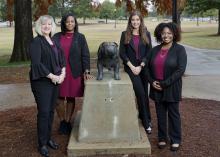Information Possibly Outdated
The information presented on this page was originally released on June 4, 2019. It may not be outdated, but please search our site for more current information. If you plan to quote or reference this information in a publication, please check with the Extension specialist or author before proceeding.
Anti-bullying training benefits 4-H’ers, others
Bullying is personal to Je’Kylynn Steen, whose experiences as a victim and witness, helped give her insight into a project that can help others who may face the same challenges.
As a community health intern with the Junior Master Wellness Volunteer Program, she served as the primary author of a new bullying module to help young people recognize this pervasive problem and learn strategies to stop it.
“Unfortunately, the real conversations about bullying often don’t happen until after tragedy strikes,” said Steen, who is majoring in human development and family science in the School of Human Sciences at Mississippi State University. “I believe we need to have these conversations before people take extreme measures.”
Junior Master Wellness Volunteer coordinators intend to help young people start those conversations.
“I framed this module for teenagers to ignite change amongst themselves, while involving the adults in their lives,” added Steen, whose goal is to serve in public health. “My aim for this curriculum and moving into my career is to make sure that teens are not only able to spot bullying, but also able to intervene safely when they see someone in need.”
Delivered through the MSU Extension Service 4-H Youth Development Program, the master wellness program trains 14- to 18-year-olds to help improve health literacy and healthy lifestyle choices.
The new module teaches students what bullying looks like in all its forms -- physical, verbal, social and cyber -- and gives them the tools to help themselves or someone else.
“We want students to be able to safely step in when they see bullying, whether it’s someone being bullied or someone who is bullying,” explained Ann Sansing, Extension instructor and program coordinator. “Our goal is for students to realize that their voices matter and their actions matter.”
Exercises in the module encourage students to employ 4-H-learned skills, including empathy, leadership, teamwork, critical thinking, problem-solving, social skills, personal safety and self-responsibility. Activities include acting out forms of bullying, creating intervention action plans and developing a social media campaign.
Internships not only help students earn required credits for their course work, but also give them hands-on experience in fields of career interest. Reagan Moak, a community health intern who has worked with the program three years and served as a peer editor during module creation, intends to become a doctor and work with those affected by sexual violence.
“The verbal, mental and physical abuse associated with sexual violence has the same implications of violence perpetrated through bullying,” Moak explained. “This internship allowed me to pursue my passions while also working with real individuals in Mississippi. The mentorship I have gotten during these three years has helped launch my journey to becoming a servant to my state and will continue to push me to strive to be a public health advocate.”
The five-member module development team consisted of Steen, Moak and Sansing, along with Jasmine Harris-Speight, Extension associate, and David Buys, Extension state health specialist and assistant professor in the MSU Department of Food Science, Nutrition, and Health Promotion. Steen, Moak and the other team members have presented their work at multiple conferences and plan to continue sharing the new module.
Four other new modules were added to the five-year-old program, including asthma awareness, healthy homes, heat and sun safety awareness, and opioid misuse and prevention.
“This program is unique because it not only educates our future generation of public health advocates, but it also equips volunteers with the knowledge to help their neighbors, friends and families,” said Moak, a junior biochemistry major in the MSU Department of Biochemistry, Molecular Biology, Entomology and Plant Pathology.
For more information about the Junior Master Wellness Program, visit the Extension website at http://extension.msstate.edu/jmw. Follow the JMWV program on Instagram at @jmwv_ms.




